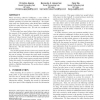Free Online Productivity Tools
i2Speak
i2Symbol
i2OCR
iTex2Img
iWeb2Print
iWeb2Shot
i2Type
iPdf2Split
iPdf2Merge
i2Bopomofo
i2Arabic
i2Style
i2Image
i2PDF
iLatex2Rtf
Sci2ools
111
click to vote
CORR
2010
Springer
2010
Springer
Harvesting Collective Intelligence: Temporal Behavior in Yahoo Answers
When harvesting collective intelligence, a user wishes to maximize the accuracy and value of the acquired information without spending too much time collecting it. We empirically study how people behave when facing these conflicting objectives using data from Yahoo Answers, a community driven question-and-answer site. We take two complementary approaches. We first study how users behave when trying to maximize the amount of the acquired information, while minimizing the waiting time. We identify and quantify how question authors at Yahoo Answers trade off the number of answers they receive and the cost of waiting. We find that users are willing to wait more to obtain an additional answer when they have only received a small number of answers; this implies decreasing marginal returns in the amount of collected information. We also estimate the user's utility function from the data. Our second approach focuses on how users assess the qualities of the individual answers without expl...
| Added | 09 Dec 2010 |
| Updated | 09 Dec 2010 |
| Type | Journal |
| Year | 2010 |
| Where | CORR |
| Authors | Christina Aperjis, Bernardo A. Huberman, Fang Wu |
Comments (0)

